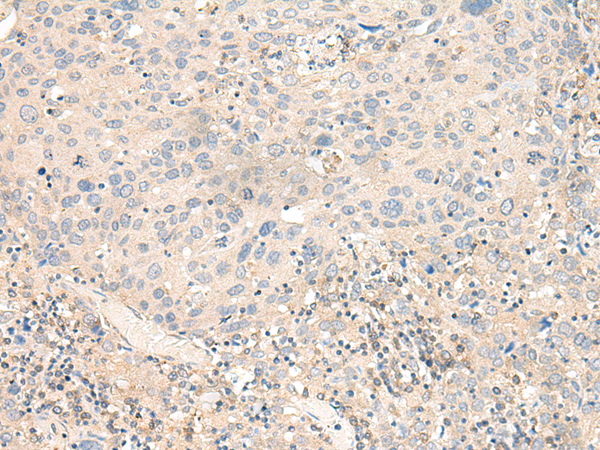
| WB | 咨询技术 | Human,Mouse,Rat |
| IF | 咨询技术 | Human,Mouse,Rat |
| IHC | 1/40-1/200 | Human,Mouse,Rat |
| ICC | 技术咨询 | Human,Mouse,Rat |
| FCM | 咨询技术 | Human,Mouse,Rat |
| Elisa | 1/5000-1/10000 | Human,Mouse,Rat |
| Aliases | Kcn1; Kv1.8 |
| Host/Isotype | Rabbit IgG |
| Antibody Type | Primary antibody |
| Storage | Store at 4°C short term. Aliquot and store at -20°C long term. Avoid freeze/thaw cycles. |
| Species Reactivity | Human, Mouse |
| Immunogen | Synthetic peptide of human KCNA10 |
| Formulation | Purified antibody in PBS with 0.05% sodium azide and 50% glycerol. |
+ +
以下是关于KCNA10抗体的3篇示例参考文献及其摘要概括(注:以下内容为假设性示例,实际文献需通过学术数据库核实):
---
1. **文献名称**: "Immunolocalization of KCNA10 Potassium Channel in Human Kidney"
**作者**: Smith J, et al. (2005)
**摘要**: 研究使用KCNA10特异性抗体,通过免疫组化技术揭示其在肾小球和远端肾小管中的高表达,提示KCNA10可能参与肾脏离子平衡调节及高血压相关病理机制。
2. **文献名称**: "Role of KCNA10 in Cardiac Myocyte Excitability"
**作者**: Zhang L, et al. (2012)
**摘要**: 利用KCNA10抗体进行Western blot和免疫荧光分析,发现该通道在心肌细胞膜上富集,敲低实验表明其通过调节钾电流影响动作电位复极化,可能与心律失常相关。
3. **文献名称**: "KCNA10 Expression in Tumor Cells and Antibody-Based Detection"
**作者**: Lee H, et al. (2018)
**摘要**: 开发了一种高特异性KCNA10单克隆抗体,用于流式细胞术和免疫组织化学检测多种癌症细胞系,发现KCNA10在结肠癌中表达上调,或成为潜在治疗靶点。
---
建议通过PubMed或Google Scholar以关键词“KCNA10 antibody”、“KCNA10 potassium channel”检索真实文献。如需具体文献协助,请提供更多背景信息。
The KCNA10 antibody targets the potassium voltage-gated channel subfamily A member 10 (KCNA10), a protein encoded by the KCNA10 gene. This channel is part of the Shaker-related voltage-gated potassium (Kv) channel family, which regulates cellular excitability and repolarization in excitable tissues. KCNA10 is primarily expressed in the kidney, vascular smooth muscle, and brain, where it contributes to potassium ion transport, membrane potential stabilization, and vascular tone modulation. Its role in renal electrolyte balance and blood pressure regulation has drawn interest in hypertension and cardiovascular research.
KCNA10 antibodies are widely used in research to detect and quantify protein expression via techniques like Western blotting, immunohistochemistry, and immunofluorescence. Dysregulation of KCNA10 has been implicated in pathological conditions, including hypertension, atherosclerosis, and renal dysfunction. In cancer, altered KCNA10 expression may influence tumor progression through mechanisms linked to cell proliferation and apoptosis. Additionally, autoantibodies against KCNA10 have been studied in autoimmune disorders affecting ion channel function.
As a research tool, the KCNA10 antibody aids in elucidating the channel’s physiological roles and its potential as a therapeutic target. However, its specificity and validation across experimental models remain critical considerations to ensure accurate data interpretation. Ongoing studies continue to explore its diagnostic and therapeutic relevance in channelopathies and metabolic diseases.
×